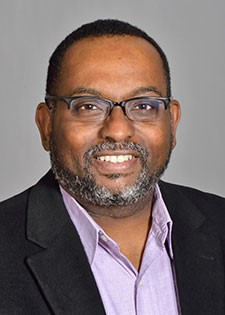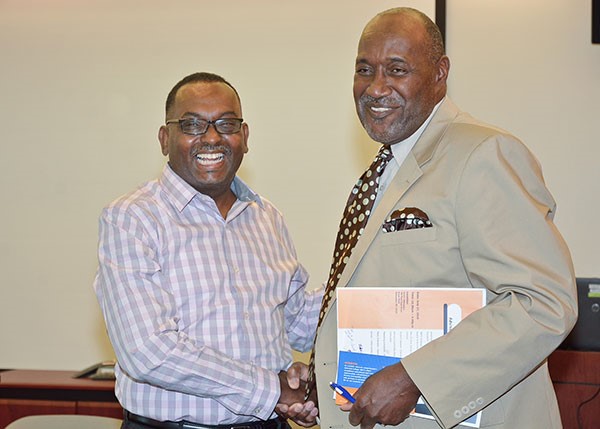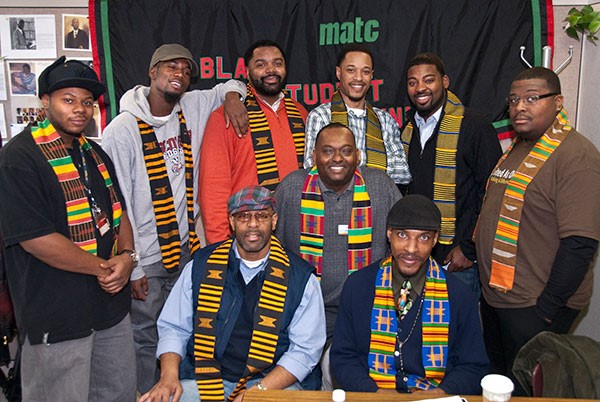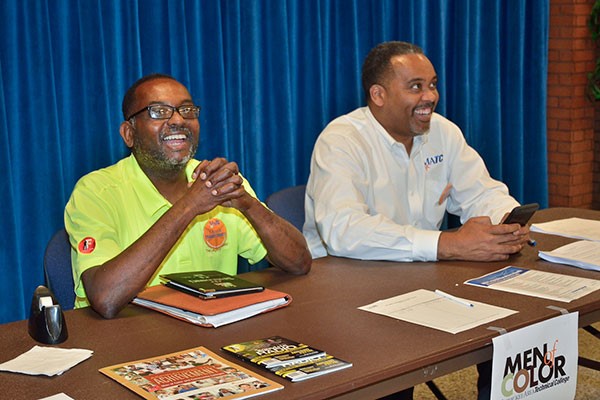
Determined to help him become a better student, Ron Fancher's sixth-grade teacher Margaret Sadowski kept him inside every day during recess and lunch periods, giving up her free time to tutor him in reading. By the end of the year, his reading scores had improved from fourth- to seventh-grade to levels. Sadowski was just one of many adults who set the stage to help him succeed. His parents, many teachers, Boys & Girls Club staff members and neighbors all worked to ensure that he would have the tools to be successful.
"That saying about it taking a village to raise a child is very true," Fancher said. "So much effort was poured into me as a child that it really increased my desire to help others. My experiences showed me what can really happen when people extend themselves. With the right help, all students can come to the level of academic standing they need to reach. It opened my eyes to the importance of caring for people. Everyone who is a success today got help from someone along the way."
Removing Barriers to Student Success
Fancher's days are now spent helping MATC students find a way to "discover and follow their passions," he said. A specialist in MATC's School of Pre-College Education and a case worker for the college's Men of Color initiative, Fancher helps GED/HSED and Adult High School students prepare to enroll in MATC associate degree, technical diploma and certificate programs. In addition to working with students already enrolled in MATC's School of Pre-College Education, he also works with students in community-based organizations that prepare students for GEDs and HSEDs. He also works to help identify and share information about resources that might remove barriers to success for students, particularly men of color.

Ron Fancher (l) is shown with Sam Williams, executive director of the Boys & Girls Club of Greater Milwaukee. Williams has been a mentor to Fancher since he was a youth and now serves on the School of Pre-College Education Advisory Committee.
He works with students to help them discover what is most important to them and to determine a career goal that will match those interests. "The beauty of MATC is that we have a plethora of programs to open the doors to people's passions," Fancher said. "It's not uncommon for students to have big dreams that they do not think they can attain.
"I urge students to take one bite of the apple at a time instead of trying to swallow the whole thing at once," he said. "For instance, if a pre-college student wants to become a nurse but doesn't know if he or she can handle the academic requirements, I suggest they start by enrolling in MATC's nursing assistant program. Then they can get a job in health care, which helps them familiarize themselves with the field and medical terminology. That builds their self-confidence and opens their eyes to what they might want to do. If they want, they can take classes to become a practical nurse, and maybe someday a registered nurse. They can earn credentials, work to earn money for school and then get back on the education highway."
Rewarding Incremental Achievements
Fancher said it is very important for students, their teachers and mentors to highlight and recognize students' incremental achievements. "When students identify that they are making progress, it leads them to be more motivated."

Fancher (center), a former advisor to MATC's Black Student Union, poses with members of the club several years ago before a kente cloth ceremony. Kente cloths are African symbols of honor.
Fancher's childhood in Milwaukee in the 1960s and 1970s prepared him well to work at MATC, the state's only majority-minority college. He learned to work with people of diverse cultures and look at issues from multiple points of view.
He attended predominantly black elementary and high schools. He and his brother rode a county bus to an almost exclusively white middle school at Sadowski's suggestion. She believed he would get a better education there than at his neighborhood school.
The beauty of MATC is that we have a plethora of programs to open the doors to people's passions.
Fancher then attended Fisk University, a Historically Black College, steeped in African-American tradition. After three years of college, his parents brought him home from the Nashville-based university because they realized he was not focusing on his studies. They told him they would not pay for more schooling, so he got a job to finance his final year of college at the University of Wisconsin-Milwaukee.
"I am haunted by the fact that I was in that rich environment at Fisk and didn't make the most of my time there," Fancher said. "I could have and should have taken advantage of all my opportunities. I had to work to get where I am now, but I made it."
Freeing Students from Past Mistakes
He shares stories of his personal failures with students to show them that he has something in common with them. "I work with a population that carries baggage," Fancher said. "Some of them need second and third chances. My challenge is to keep individuals from being held hostage by their past. I think if I show students what I have in common with them - show them that I'm a person with blemishes - it helps to encourage them that they can be successful, too."

Ron Fancher (l) and Walter Lanier, key leaders of MATC's Men of Color initiative, shared information about the newly launched program at Staff Coordination Day.
Fancher worked for the Boys & Girls Club of Greater Milwaukee for years before joining the MATC staff in 1988. He has served in a number of MATC positions, always working to help students who are facing uphill battles to become successful.
He is proud of his work and of the college. "MATC is the most important educational institution in southeastern Wisconsin," he said. "If MATC doesn't succeed, there is a population in southeastern Wisconsin that will never have a chance. Places like MATC really allow people to pull themselves out of poverty and become successful."

